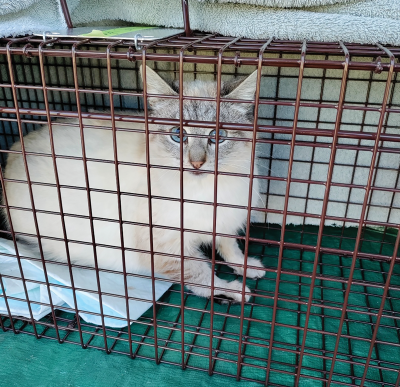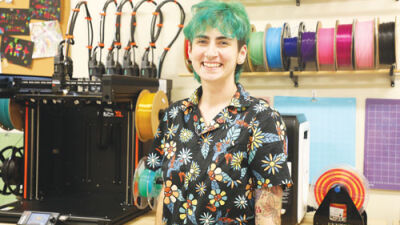
Opal rests in her crate, waiting to be spayed. She is among the cats that have been captured, fixed and freed as part of Eve Sandoval’s TNR efforts in Madison Heights.
Photo provided by Eve Sandoval
MADISON HEIGHTS — If left unchecked, feral cats will multiply like rabbits. A female cat can birth 20 or more kittens in one year, and more than 420 kittens in a lifetime. And the life they face outdoors is one fraught with peril, such as starvation, freezing to death or getting hit by traffic.
That’s why Eve Sandoval, of Madison Heights, a self-described animal lover, advocates a practice called “trap, neuter, release,” or TNR, for short. The idea is to trap a feral cat and bring it to a veterinarian to be spayed or neutered, a procedure that takes about 24 hours from drop off to pickup. Then, after a day or two monitoring the cat in its crate — and, of course, feeding it and keeping its crate clean — the catcher brings the cat back to where it was found and releases it back to the wild.
Once neutered, the cat will undergo an adjustment period. Male cats will no longer wander long distances in search of mates, instead becoming porch cats or yard cats. They will usually stop spraying their surroundings as well. Most importantly, they won’t create more cats in need of homes.
To encourage people to do their part, Sandoval’s TNR group has partnered with All About Animals Rescue, a low-cost clinic located at 23451 Pinewood St. in Warren. The clinic offers an affordable service for spaying and neutering TNR cats. It also rents out traps and teaches people how to do TNR, a free online course that lowers the cost of spaying/neutering to $25 per cat. The usual cost without the course is $40 per cat. The clinic usually takes cats on Mondays and Tuesdays. It is advised to check its website, allaboutanimalsrescue.org, for preferred drop off and pickup times.
As for Sandoval’s group, she operates out of a Facebook group, “Madison Heights, MI - TNR,” which can be found at facebook.com/groups/madisonheightsmi.tnr. As of the end of May, the group had about 110 members and was growing. The discussions there help educate people about how to safely capture, care for and release cats.
“Ideally, you’ll hold them for a couple days after they’re spayed or neutered, but some people just release them and I don’t blame them, since it’s a lot of work,” Sandoval said. “The females do need a bit more care, because their surgery is more intensive. But I gauge whether the cat is flipping out in the trap and possibly hurting themselves trying to get out, at which point there’s no sense in keeping them — it’s best to just let them out where there’s not much traffic, releasing them where they were first trapped, since it’s important they’re familiar with the area. And, of course, stay in touch with the people who first saw them, and see how the cats are holding up later.”
She said that once the cat is captured, it’s smart to swaddle the crate in an old towel while still leaving room for air, since darkness has a calming effect on feral cats. This can help with transporting them to and from the veterinary clinic for their procedure.
Sandoval said fixing feral cats is the most humane way to help them. She said kittens have about a 25% survival rate living outside, while adults can suffer various medical conditions that can lead to a painful death, as well as all the dangers that exist outside, from weather to traffic. There is also the risk that stray cats pose to others, carrying fleas and parasites and worms, as well as digging and defecating on private properties and in gardens, and preying excessively on birds.
Stray cats are easier to catch once they’re on a routine feeding schedule, she said, since this earns their trust and gives you the upper hand to set a trap. Many cats are wary of traps, however, and Sandoval said she has better luck catching them at nightfall or early morning since cats are more active at dusk and dawn. She prefers a trap called Tru Catch, which she said is especially safe.
Sandoval formed her group in December 2023 after she saw a post on social media about a kitten who needed help in the south end of Madison Heights around late November. She worked with the woman who saw the kitten and was able to trap him, get him fixed and vaccinated, and even find him a home. After four weeks outdoors, he was on the cusp of going feral, so he needed a family that would be very patient with him, but Sandoval said he’s doing well.
However, while in the area where she trapped him, Sandoval noticed four or five other cats walking around. When she asked the resident about them, she was told there were nearly a dozen strays on the block, and more throughout the area. Sandoval has since learned about certain pockets of the city that are overrun with stray cats. If left unchecked, the population will only grow.
More recently, on Feb. 17, Sandoval helped rescue a cat that was stranded on a power line over a home on Windemere Street. The cat had lost its rear right leg some time ago — it had healed, Sandoval said — and was trapped high up, exposed to the bitter cold.
With the help of Andy’s Arbor Care, Sandoval was able to safely retrieve the cat and get it fixed at All About Animals Rescue. The cat is currently undergoing rehabilitation, Sandoval said.
She added that she’s deeply appreciative of everyone who has supported her group so far, either as a volunteer trapper or as a donor. One of her most dedicated volunteers is Julie Weaver.
In an email, Weaver said she prefers the term “community cats” to “feral cats,” since the latter can sound scary to people. In reality, stray cats are not looking to harm anyone — they are simply trying to survive.
“Community cats never choose this life. They live this life because some were failed by humans,” Weaver said. “Watching them trying to survive on the street is heartbreaking. Holding a dying kitten in your hand is beyond heartbreaking. It truly takes a community to make change, to help these community cats live better lives. I am just a small voice with countless others, trying to make a difference in our community.”
For more information, call All About Animals Rescue at (586) 879-1745.
 Publication select ▼
Publication select ▼



















